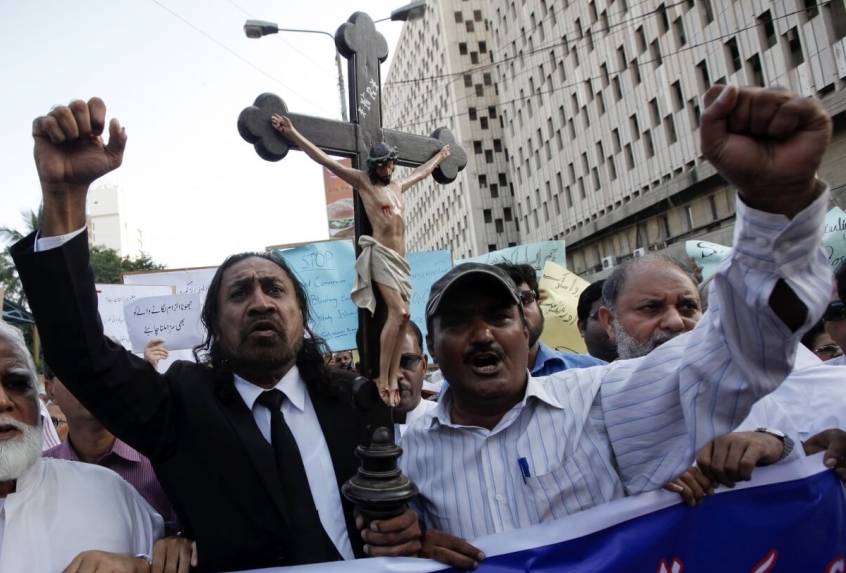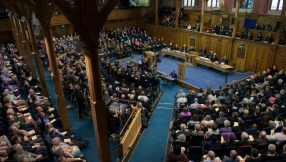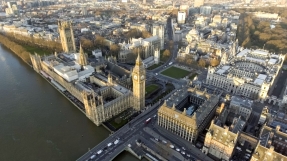
The UK Foreign Office should introduce "mandatory" religious literacy training for staff and consider imposing sanctions in order to address "shocking" levels of Christian persecution, a major Government-sponsored review has said.
The report, by the Bishop of Truro, the Rt Rev Philip Mounstephen, said that the response of the Foreign and Commonwealth Office (FCO) to Christian persecution could only be "summed up as 'good in parts'".
"Whilst positive evidence of support was certainly identified, taken in the round, FCO support might best be summed up as 'good in parts'," it reads.
Although the FCO has a Freedom of Religion or Belief (FoRB) Tool Kit for overseas bureaus, the review found that there was "limited awareness" of its existence, which in turn had led to "limited implementation".
"Consistent with this evidence, the apparent paucity of awareness of the challenges facing the Christian community reveals a lack of religious literacy that undoubtedly impacts the full exercise of all FoRB rights," the report reads.
It continues: "There is a significant cultural knowledge deficit in the awareness and practice of religion in society in the United Kingdom which witnesses have suggested is increasingly evident in the culture of the Foreign Office Network," the report reads.
"Given the centrality of religious belief to the vast majority of the world's population and communities this poses a particular challenge for British diplomats seeking to operate between these two worlds."
Evidence submitted to the review, commissioned by Foreign Secretary Jeremy Hunt, complained of an "inconsistency in when and how the UK speaks out about persecution".
Submissions suggested that when the UK did speak about persecution, it seemed to "reflect the increasing secularisation of our society and retreat from Christianity as a largely commonly held faith".
"Quite rightly, witnesses felt, there was an outcry from the UK government over the Rohingya Muslim crisis in Myanmar, but politicians and media said very little about the Christian minority groups who were targeted as much as the Rohingyas, and who also had to leave their homes and country," it reads.
In addition, the review found that Christian persecution has "to some significant extent been overlooked in the West".
"And the western response (or otherwise) has no doubt too been tinged by a certain post-Christian bewilderment, if not embarrassment, about matters of faith, and a consequent failure to grasp how for the vast majority of the world's inhabitants faith is not only a primary marker of identity, but also a primary motivation for action (both for good or ill)," it said.
There was "real strength of concern" that UK aid is being invested in a "religion blind" manner to the detriment of religious minorities.
Evidence submitted on Pakistan, for example, raised the concern that UK funding towards mainstream education "may in part be contributing to the radicalisation of school age children".
"Many of the significant challenges undermining the ability of Christian minorities to exercise their inalienable rights are linked to the manner in which the generous UK financial support to the people of Pakistan is applied," the report said.
"Without a significant change of direction, the protection of vulnerable minorities, a central tenant of FoRB, will continue be undermined."
In Iraq, a similar concern was raised, with the offer of financial assistance for those affected by ISIS seen as "less than wholehearted".
"In these circumstances there must be a strong case for the British Government to review the channelling of so much of its international aid assistance through UN and other agencies which seem to have developed a 'religion-blind' policy: a policy which fails to ensure that those whose need has been specifically generated by their creed, through the suffering of persecution, receive their fair share of aid," the report said.
The UK's diplomatic bureaus were "perceived as operating at arm's length" by faith communities who also interpreted their policy of "working behind the scenes" as an "excuse for inaction".
Some respondents said that the willingness of officials to speak up about religious freedom appeared to be dependent on the individual official or the UK's economic interests in the country.
"There was a general feeling that much depended on the individual FCO official concerned. If that individual was passionate about freedom of religion or belief and had a genuine interest in their situation, then good relationships developed and there was confidence to seek support," the report said.
"However, far too often we heard that UK missions are perceived as operating at arm's length and that other international missions were sometimes more approachable, proactive and reactive, especially those of the US, Scandinavian countries and the EU."
Although submissions agreed that Christians should stand up for all minorities suffering for their faith, there was a "strong feeling" that "for too long those who arguably suffer the greatest persecution in terms of sheer numbers across the globe have not been given the same attention as other minorities by the UK government."
There was also a "perceived imbalance" in the numbers of Christians being granted asylum by the UK Home Office in comparison to those of other minority faiths, while others providing evidence spoke of the "disturbing reality" of Christian asylum seekers in the UK experiencing persecution here.
Elsewhere, the report cited "universal criticism" about the apparent unwillingness of the UK Government to offer asylum to Asia Bibi, a Pakistani Christian woman acquitted of the death sentence for blasphemy.
Responding to the report, Mr Hunt said: "The sense of misguided political correctness that has stopped us standing up for Christians overseas must end.
"At home we all benefit from living in a tolerant, diverse society and we should not be afraid of promoting those values abroad. It is a sad fact that Christians are the most persecuted religious group in modern times. I am determined to show that we are on their side."
The report includes interim findings released earlier this year, which warned that "in some regions, the level and nature of persecution is arguably coming close to meeting the international definition of genocide, according to that adopted by the UN."
Other recommendations for the Foreign Office include seeking a Security Council Resolution urging all governments in the Middle East and North Africa to protect Christians and other persecuted minorities, and allow UN observers to monitor the necessary security measures.
A portion of the Government's Magna Carta Fund for human rights work should also be set aside to help persecuted Christians.
Bishop Mounstephen said: "Addressing this issue with the seriousness it deserves represents a step change for democratic governments. My hope is that in adopting my recommendations the Foreign Office will be able to bring its considerable experience and expertise to bear in helping some of the planet's most vulnerable people."
Lord Ahmad of Wimbledon, the Prime Minister's Special Envoy for Freedom of Religion or Belief said: "Freedom of Religion or Belief has been a key priority for the FCO within our human rights agenda in recent years.
"Both strategically and through a focus on priority countries, we have not only raised the profile of religious persecution and abuse, but also acted on the rising tide of Christian persecution across the world with some success.
"We therefore note the findings of this independent report and will consider the recommendations carefully and how they may further enhance our work in tackling Christian persecution specifically and in strengthening our work on Freedom of Religion or Belief."
Open Doors UK, a Christian organisation which gave evidence to the review, said the report was a "good first step" to addressing the issue of Christian persecution.
"The UK Government must act now. It must focus attention on the countries where persecution is most severe and where the situation is rapidly deteriorating," said CEO Henrietta Blyth.
"Persecution is a global problem. Governments must act to enforce Article 18 of the Declaration of Human Rights - the freedom to choose a religion or belief or to choose no religion or belief.
"This is not about politics, it's about freedom. Sadly, in many countries Christianity is criminalised and there are thousands of Christians locked up because of their faith. Many are tortured. It's wrong."
While the UK has a Special Envoy on Freedom of Religion or Belief, the position is not a permanent one. Mrs Blyth said this needed to change.
"Christian persecution is not a party political issue," she said.
"We believe that the Prime Ministerial post of Special Envoy on Freedom of Religion or Belief should be a permanent role so that its existence is not subject to any political agenda.
"This will also ensure that persecuted Christians are rightly placed at the heart of government decisions on trade and aid."
Christian Solidarity Worldwide chief executive Mervyn Thomas said: "CSW welcomes every effort that advances the right freedom of religion or belief for all religious communities.
"This report's recognition of violations targeting Christian communities across the world, many of whom feel their plight is neglected, emphasises the universality of this right by advocating that, along with other targeted religious communities, they too should receive assistance."













